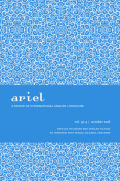Globalization, Diaspora and Cosmopolitanism in Kiran Desai's The Inheritance of Loss
Keywords:
Kiran Desai, <i>The Inheritance of Loss</i>, Globalization, Cosmopolitanism, DiasporaAbstract
Kiran Desai’s 2006 novel The Inheritance of Loss is structured in such a way that it explores interconnections between colonialism, nationalism, postcolonial conflicts, globalization, class-based exploitation, cosmopolitanism, migrancy, and diaspora. Critical responses to this novelreflect the limitations of attempting to classify it as a postcolonial, diasporic or even transnational text because the narrative itself problematizes all such categories of identity. This article considers the usefulness and limitations of cosmopolitan approaches to The Inheritance of Loss in light of recent arguments that globalization is producing a new kind of fictional writing which may be better described as cosmopolitan than postcolonial because it moves beyond the cultural categories described in postcolonial theory without ignoring inequalities of power. Although globalization is often viewed as a recent phenomenon, Paul Jay has argued persuasively that it should be seen as a longer-term process that includes the long histories of imperialism, colonization, decolonization, and postcolonialism. From this perspective, Desai’s novel The Inheritance of Loss can be read as a critique of interrelated historical processes that, as the title suggests, generate a heritage of loss for each successive generation.


